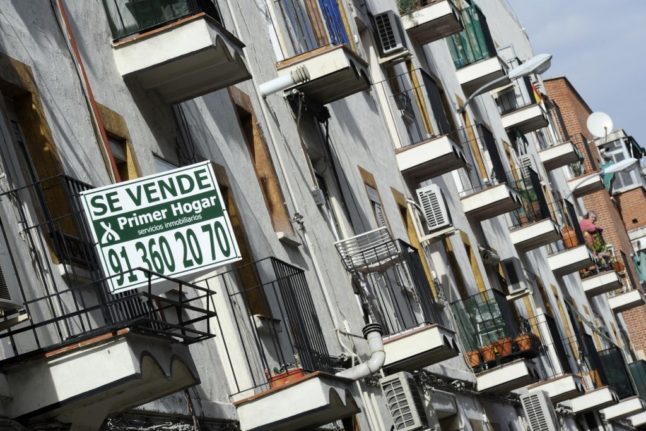When buying a used property in Spain (as opposed to a new one) you have to pay the Impuesto de Transmisiones Patrimoniales (property transfer tax) known as ITP.
ITP is the acronym used to describe the tax that applies to the transfer of ownership of a second-hand property in Spain. It varies across Spain’s regions, and generally ranges from 4 percent to 10 percent depending where your property is.
READ ALSO: Ten acronyms you need to know to buy a property in Spain
When buying a house in Spain, you will either pay VAT (IVA) or the ITP. Put very simply, if you are buying a new property, you will pay IVA, whereas if you buy a second-hand home, you will pay ITP.
You will not, however, and should not, pay both.
According to Spanish consumer watchdog OCU, the ITP on second-hand property purchases by region are:
Andalusia: 6 percent
Aragón: 8 to 10 percent
Asturias: 8 percent
Balearic Islands: 8 percent
Canary Islands: 5 percent
Cantabria: 8 to 10 percent
Castilla y León: 8 to 10 percent
Castilla-La Mancha: 6 percent
Catalonia: 10 percent
Valencia – 10 percent
Extremadura: 7 percent
Galicia: 7 percent
Madrid: 6 percent
Murcia: 8 percent
Navarra: 5 percent
Basque Country: 4 percent
La Rioja: 7 percent
How to (legally) avoid paying it
However, Spanish law does allow for certain circumstances in which a buyer can avoid paying this extra tax, or at the very least appeal it. If a mortgage is not required for the purchase, it is possible to sign a private contract between the two parties that bypasses the ITP. In order for it to be legitimate before important third parties, such as the Spanish tax agency (Agencia Tributaria), it must be put in a public deed before a notary.
The time limit for the Agencia Tributaria to determine the ITP and collect the tax is four years from the date of the transfer, which begins as soon as the contract is presented to the notary.
Let’s take an example.
Say you bought a second-hand flat in Galicia and signed a private contract with the seller which was not notarised and not registered in the Land Registry. The time limit for the Spanish tax authorities (four years) to demand payment of the ITP had expired for reasons such as the fact that the buyer had the house in his name in the Cadastre and had been paying the IBI for more than four years, i.e. he was the owner of the property and had paid la Comunidad expenses since purchasing the property.
READ ALSO: ‘La comunidad’: What property owners in Spain need to know about homeowners’ associations
This shows that there was a handover of the property by the seller without a deed.
In this case, the four year period has passed owing to the fact that it began from the time the private contract was registered in a public register (ie, the Cadastre).
What if the seller dies?
Another example could be if the seller dies without having made the private contract of sale public.
Now the seller’s heirs or children, who let’s say died more than five years ago, must appear at the notary’s office, but the four year period for the ITP payment has already passed.
The buyer, however, may wonder whether or not he or she must pay the ITP for the purchase of the apartment, considering that it was bought through a private contract over 10 years ago.
In Spain, for the purposes of the legal statute of limitations, the date of the private contract is presumed to be that of its submission for payment, even if it is an earlier date.
“In this case, the death of one of the sellers is a fact that allows us to attest to the sale, since the deceased seller could not sign the contract once they had died. Therefore, since the death occurred more than five years ago, the ITP can be considered expired. Why? Because the four-year limitation period provided for in article 66 of General Tax Law 58/2003 has elapsed,” Salvador Salcedo, lawyer at Atico Jurídico, told Spanish property site Idealista.
Tasación Pericial Contradictoria (TPC)
If none of the above conditions apply to you, you are still able to appeal the ITP payment throughout something called a Tasación Pericial Contradictoria, known as a TPC. This can be a relatively successful way to avoid or reduce the payment because assessments that are appealed can be (and often are) annulled.
By appealing, you would be challenging the the valuation of the property done by the regional or local government. If the appeal is upheld, you will not pay any additional taxes to that paid in the past for ITP or inheritance.
With a TCP, however, you can often obtain a reduction of the ITP.
Is it ever worth paying IVA rather than ITP?
In some cases, it could be worth your while to pay IVA rather than ITP on a second-hand property – even if the total amount you’d pay on IVA would be higher in one lump sum.
If there is the option to choose, some more entrepreneurial buyers may want to pay rather IVA, not the ITP, because they could then deduct that cost and pass it onto customers. In this example, it would likely be of interest to someone buying a property in order to rent it out.
Make sure to seek legal advice from an expert before attempting to not pay ITP tax on a Spanish property.



 Please whitelist us to continue reading.
Please whitelist us to continue reading.
Member comments